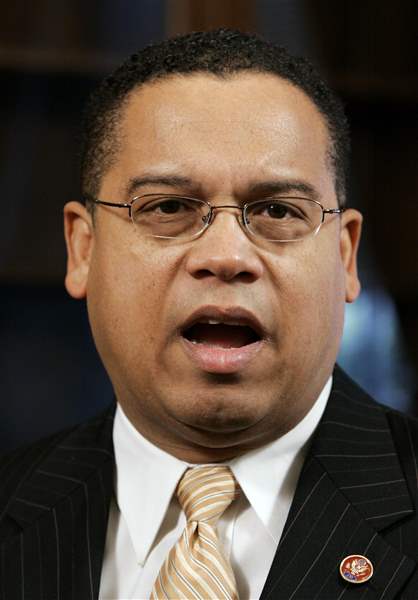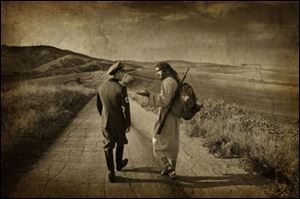
Religion news shows no signs of slowing down
9/22/2009
Ellison
HARAZ N. GHANBARI / AP

Michael Belk said he titled this photo ‘The Second Mile,' after Matthew 5:38-41, with Jesus walking alongside a Nazi and carrying the soldier's rifl e and backpack to illustrate forgiveness.
MINNEAPOLIS — The nation may be struggling with a host of problems, including health care, the economy, global warming, and wars on two fronts, but when it comes to religion news the beat is booming.
After four days at the Religion Newswriters Association's annual conference here last week, my head is still reeling from the wealth of information delivered in lectures, panel discussions, workshops, and presentations of back-to-back meetings.
Writing about faith and values can be a daunting task, with the inimitable complexities and subtleties of the world's religions compounded by the strong feelings attached to many hot-button issues. Just type the word “homosexuality,” for example, and a reporter is immediately stepping across a journalistic landscape dotted with land mines.
Adding to a reporter's stress level is the fact that there are no laws requiring religious organizations to open their books, unlike public agencies that must comply with Freedom of Information and sunshine laws.
The nonprofit RNA, celebrating its 60th anniversary, was founded by journalists “to promote excellence in media coverage and in public discourse about religion.” While the ranks of journalists are shrinking, religion news is as abundant as ever despite the economic turmoil and media changes.
At last week's conference, the sessions covered a broad range of topics, including spirituality and health; faith and politics; immigration's impact on religion; the New Calvinists; House churches and “Jew-It-Yourself” services; hip-hop and hymns; Tweets and videos in the newsroom; the future of faith; the emerging church; Hinduism in America, and rights of religious conscience in modern society.
U.S. Rep. Keith Ellison, the Minnesota Democrat who in 2006 became the first Muslim elected to Congress, had been scheduled to give the keynote address on Sept. 12 entitled “An American Muslim in Congress.” But he canceled at the last minute when President Barack Obama decided to speak on health care at Minneapolis' Target Center the same day.
Mr. Ellison made a quick round-trip to Washington and back, invited by the President to fly with him to Minneapolis aboard Air Force One. It was, he said, an offer he could not refuse.
A Detroit native who moved to Minnesota to attend law school in 1987, Mr. Ellison spoke to reporters by video and said his mother always taught him not to be arrogant about his beliefs. She told him that “other faiths are not wrong,” he said, and illustrated her point by telling her son that one plus three equals four, but so does two plus two and zero plus four.
The Mayo Clinic's Joan Henriksen Hellyer, a nurse and bioethics scholar, and Joel Wu, a research fellow, together related several new ethical dilemmas that have yet to be defined and resolved.
One example involved implantable cardiac devices, an increasingly popular medical tool that is surgically implanted in patients' chests to provide defibrillator-type shocks when their hearts stop beating.
But what is an ethicist to do when, years later, the patient develops a terminal disease such as cancer and, lying on his or her deathbed, rather than going peacefully they keep getting jolted back to life by an ICD?
Who decides when it is time to shut off the device and who bears the responsibility for flipping the switch that essentially will end the person's life?
Dr. Greg Plotnikoff, a proponent of holistic and alternative medicine, spoke of the largely untapped medical field that integrates mind, body, and spirit.
A brilliant and visionary overachiever, Dr. Plotnikoff is an associate professor at the University of Minnesota Medical School and also on the faculty of Keio University School of Medicine in Tokyo. Fluent in Japanese, he teaches traditional Kampo medicine to Japanese med students.
Before becoming a physician, Dr. Plotnikoff studied for a master's degree at Harvard Divinity School because from the outset of his career, he wanted to combine religion and health.
Dr. Plotnikoff and his team use diverse treatments ranging from exercise and nutrition to such exotic therapies as acupuncture, aromatherapy, biofeedback, and reflexology.
He goes out of his way to avoid prescribing drugs, preaching “fundamentals first, then pharmaceuticals,” while developing effective mind-body alternatives to traditional medicine.
The Rev. Harvey Cox, a renowned theologian and author who retired last week after 44 years at Harvard University, gave a talk about his new book, The Future of Faith, in which he contends that modern Christianity is returning to the style of the ancient church.
Upon his retirement, the 80-year-old scholar took advantage of a clause in his contract as Hollis Professor of Divinity, a chair that was endowed in 1721, that allows him to graze a cow in Harvard Yard.
On Sept. 10, Mr. Cox rented a bovine and had it taken to the university's lawn.
The farmer told him the cow's name was Pride, Mr. Cox said, which led him to comment that pride is one of the seven deadly sins. The farmer responded: “I thought at Harvard pride wasn't a sin.”
Aside from the conference lectures and workshops, we toured the Hindu Temple of Minnesota — the largest in North America — and previewed some notable new books.
Jeffrey Sheler, a free-lance writer who for 24 years covered religion for U.S. News & World Report, has written an unauthorized biography of Rick Warren, the prominent pastor of Saddleback Church and author of mega-selling The Purpose Driven Life.
Prophet of Purpose: The Life of Rick Warren, will be published by Doubleday on Nov. 3. Mr. Sheler said he insisted on an unauthorized bio because he wanted the freedom to write with total objectivity and not be bound to producing a fluff piece subject to the church's approval. Mr. Warren balked at first, he said, but eventually agreed to a series of interviews.
Stephen and Alex Kendrick, producers of the independent hit film Fireproof, are coming out with a new version of The Love Dare book, this time with 365 daily devotions aimed at building strong marriages year-round.
Cathleen Falsani, religion columnist for the Chicago Sun-Times and author of Sin Boldly, set her sights on the spiritual dimensions of the Coen Brothers' quirky, intelligent films.

Ellison
Her new Zondervan book, The Dude Abides: The Gospel According to the Coen Brothers, analyzes the moral universe of Joel and Ethan Coen film by film. Each chapter takes a look at “The Forest,” “The Trees,” and “The moral of the story is …” on all of the Coens' film including The Big Lebowski, Raising Arizona, and O Brother, Where Art Thou?
The 14th chapter analyzes the Coen Brothers' just-released movie, A Serious Man.
One particularly provocative media project unveiled at the RNA conference was Journeys with the Messiah: A Fashion Photographer Journeys with Christ.
Michael Belk, who for more than 30 years has produced photos for such glamour mags as Vogue, Vanity Fair, GQ, and Elle, said he felt God calling him to use his talents and time for a deeper purpose.
He spent 18 months photographing Jesus — portrayed by an Italian model — in sepia-toned images in which the Son of God is pictured talking to a prostitute, a Nazi, a Ferrari owner, a bankrupt businessman, and in a variety of other scenes that juxtapose the historic Jesus and ancient settings with and modern props and people.
Mr. Belk, 61, who bankrolled the project himself, said he wanted to “strip out ‘religion' to show the raw life and message of Jesus — to enable people to think about him in a different way than they ever have before, or perhaps for the first time.”
The photos were shot in Matera, Italy, where Mel Gibson filmed The Passion of The Christ, and look ancient in one sense but are infused with the author's fashion sense. They are available in a variety of formats including fine art prints, posters, a DVD, a coffee-table book, and screen savers. Information is available online at thejourneysproject.com.
David Yonke is The Blade's religion editor. Contact him at dyonke@theblade.com or 419-724-6154.